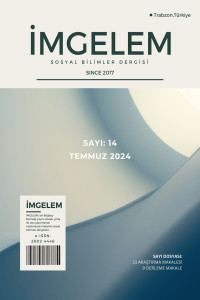A Historical View On The Relationship Between Music And Melancholy In The Western European Musical Tradition
Öz
This study tries to follow the ways in which the phenomena of music and melancholy were associated with each other in Western European cultural history, in the light of the paradigmatic evolution of thought. Accordingly, at least until the Renaissance and Baroque period, associations between music and melancholy had an external character with therapeutic and pathogenic qualities in the medical context of the ancient medical tradition Until this period, music was used as a palliative measure against melancholia within the framework of ancient medical tradition, as it was considered a branch of science that pointed to universal harmony rather than an aesthetic expression style. With the Renaissance period, melancholy became one of the central elements of aesthetic interest when it began to signify a collective feeling as an emblem of a contemplative life that developed through the meanings of being in this world, rather than an individual pathology. Melancholy, which has become one of the central themes of literary and figurative arts, thus begins to attract the attention of music. Adhering to the mimetic understanding of art throughout the Baroque period, music tries to represent the theme of melancholy with its own tools. What happened with the Romantic period was that melancholy began to permeate music rather than being a theme. In particular, the abstract expression tools contained in instrumental music and the rise in aesthetic reception provide a unique means of expression for the paradox of the modern self, with its developing self-perception and changing understanding of time.
Anahtar Kelimeler
Kaynakça
- Alewine, K. M. (2017). Melancholia and Consciousness in Music, Art and Literatüre, Doctoral Dissertation, The University of Texas Medical Branch.
- Arikha, N. (2007). Passions and tempers: A history of the humours, New York: HarperCollins.
- Bar-Yoshafat, Y. (2021). On The Musically Melancholic: Temporality and Affects in Western Music History, History of European Ideas, 47(6), 918-938.
- Berger, K. (2007). Bach’s Cycle, Mozart’s Arrow: An Essay On The Origins Of Musical Modernity, Univ of California Press.
- Bonds, M. E. (2020). Expression, McAuley, T. Nielsen, N. Levinson, J. & Phillips-Hutton, A. (Eds.), The Oxford Handbook of Western Music and Philosophy, Oxford University Press.
- Bowie, A. (2007). Music, Philosophy, and Modernity, Cambridge University Press.
- Davies, S. (1994). Musical Meaning and Expression, Ithaca, NY: Cornell University Press.
- Davies, S. (2006). Artistic expression and the hard case of orl music, M. Kieran (Ed.), In Contemporary Debates in Aesthetics and the Philosophy of Art (179-191), Oxford: Blackwell Publishing.
- Dols M. W. (2013). Mecnun: Orta çağ İslam toplumunda deli, D. G. Dinç (Çev.), İstanbul: Pinhan Yayıncılık. Ehrenreich, B. (2009). Sokaklarda Dans, İstanbul: Versus Kitap.
- Földényi, L. F. (2016). Melancholy, T. Wilkinson (Trans.), Yale University Press New Haven and London.
- Frisch, W. (2000). “You must remember this”: memory and structure in Schubert’s string quartet in G Major, D. 887. The Musical Quarterly, 84(4), 582-603 Oxford University Press.
- Frosch, W. A. (1987). Moods, madness, and music. I. Major affective disease and musical creativity. Comprehensive psychiatry, 28(4), 315-322.
- Goldberg, H. (2017). Chopin’s oneiric soundscapes and the role of dreams in romantic culture, Chopin and his orld, Edited by Jonathan D. Bellman and Halina Goldberg, Princeton University Press, Princeton and Oxford.
- Gowland, A. (2006). The Problem of Early Modern Melancholy, Past&Present, 191(1), 77-120.
Öz
Bu çalışma Batı Avrupa kültür tarihinde müzik ve melankoli fenomenlerinin birbirleri ile ilişkilendirilme biçimlerini düşüncenin paradigmatik evrimi ışığında takip etmeye çalışmaktadır. Buna göre en azından Rönesans dönemi ve Barok döneme kadar müzik ve melankoli arasındaki ilişkilendirmeler antik tıp geleneğinin medikal bağlamında terapötik ve patojenik nitelikler taşıyan dışsal bir karakter taşımaktadır. Müzik bu dönemlere kadar estetik bir dışavurum tarzı olmaktan çok evrensel harmoniyi işaret eden ve çoğunlukla matematik ve retorikle ilişkili bir bilim olarak değerlendirilmesi nedeniyle antik tıp geleneği içerisinde beden sıvılarındaki bir dengesizliği ifade eden melankoliye karşı palyatif bir tedbir olarak kullanılagelmiştir. Rönesans dönemiyle birlikte melankoli bireysel bir patolojiden ziyade bu dünyada bulunmanın anlamları üzerinden gelişen tefekküre dayalı bir yaşamın amblemi olarak kolektif bir duyguyu imlemeye başladığında estetik ilginin merkezi unsurlarından biri haline gelir. Edebi ve figüratif sanatların merkezi temalarından biri haline gelen melankoli böylelikle müziğin de ilgisini çekmeye başlar. Barok dönem boyunca mimetik sanat anlayışına bağlı kalan müzik, melankoli temasını kendi araçları ile temsil ve taklit etmeye çalışır. Romantik dönemle birlikte gerçekleşen şey ise melankolinin müziğin bir teması olmaktan çok ona nüfuz etmeye başlamasıdır. Bilhassa enstrümantal müziğin içerdiği soyut anlatım araçları ile estetik alımlamasındaki yükseliş, gelişen benlik algısı ve değişen zaman kavrayışı ile modern benlik paradoksu için eşsiz bir ifade aracı sağlar. Bu bakımdan bu çalışmada sorgulanan bir diğer unsur, temsile direnen nüanslı ve özsel bir insanlık durumu olarak melankolinin kendisini ifade etmek için uygun bir dil yaratması bağlamında enstrümantal müziğin antromorfik öznesi olarak değerlendirilip değerlendirilemeyeceğidir.
Kaynakça
- Alewine, K. M. (2017). Melancholia and Consciousness in Music, Art and Literatüre, Doctoral Dissertation, The University of Texas Medical Branch.
- Arikha, N. (2007). Passions and tempers: A history of the humours, New York: HarperCollins.
- Bar-Yoshafat, Y. (2021). On The Musically Melancholic: Temporality and Affects in Western Music History, History of European Ideas, 47(6), 918-938.
- Berger, K. (2007). Bach’s Cycle, Mozart’s Arrow: An Essay On The Origins Of Musical Modernity, Univ of California Press.
- Bonds, M. E. (2020). Expression, McAuley, T. Nielsen, N. Levinson, J. & Phillips-Hutton, A. (Eds.), The Oxford Handbook of Western Music and Philosophy, Oxford University Press.
- Bowie, A. (2007). Music, Philosophy, and Modernity, Cambridge University Press.
- Davies, S. (1994). Musical Meaning and Expression, Ithaca, NY: Cornell University Press.
- Davies, S. (2006). Artistic expression and the hard case of orl music, M. Kieran (Ed.), In Contemporary Debates in Aesthetics and the Philosophy of Art (179-191), Oxford: Blackwell Publishing.
- Dols M. W. (2013). Mecnun: Orta çağ İslam toplumunda deli, D. G. Dinç (Çev.), İstanbul: Pinhan Yayıncılık. Ehrenreich, B. (2009). Sokaklarda Dans, İstanbul: Versus Kitap.
- Földényi, L. F. (2016). Melancholy, T. Wilkinson (Trans.), Yale University Press New Haven and London.
- Frisch, W. (2000). “You must remember this”: memory and structure in Schubert’s string quartet in G Major, D. 887. The Musical Quarterly, 84(4), 582-603 Oxford University Press.
- Frosch, W. A. (1987). Moods, madness, and music. I. Major affective disease and musical creativity. Comprehensive psychiatry, 28(4), 315-322.
- Goldberg, H. (2017). Chopin’s oneiric soundscapes and the role of dreams in romantic culture, Chopin and his orld, Edited by Jonathan D. Bellman and Halina Goldberg, Princeton University Press, Princeton and Oxford.
- Gowland, A. (2006). The Problem of Early Modern Melancholy, Past&Present, 191(1), 77-120.
Ayrıntılar
| Birincil Dil | Türkçe |
|---|---|
| Konular | Müzik Sosyolojisi |
| Bölüm | Makaleler |
| Yazarlar | |
| Yayımlanma Tarihi | 17 Temmuz 2024 |
| Gönderilme Tarihi | 22 Mayıs 2024 |
| Kabul Tarihi | 26 Haziran 2024 |
| Yayımlandığı Sayı | Yıl 2024 Sayı: 14 |

This work licensed under a Creative Commons Attribution-NonCommercial 4.0 International License.
Please click here to contact the publisher.


